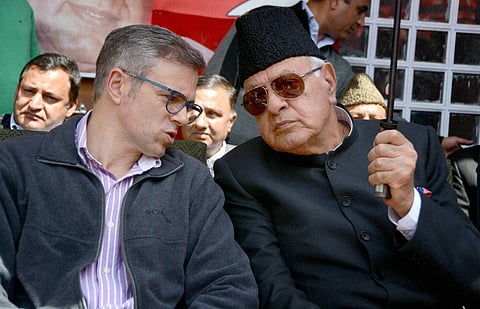The question of whether Jammu and Kashmir (J&K) should be granted statehood remains contentious, especially in the wake of recent events. The latest terror attack, which claimed the lives of seven civilians, has reignited the debate about the region’s political future, though Chief Minister Omar Abdullah remains reluctant to label it as a terror attack. While elections were held following the abrogation of Articles 370 and 35A, which stripped J&K of its special status, the victory of the National Conference (NC) and its ally, the Congress, raises concerns about the region’s long-term stability. Both parties, despite now refraining from calls to restore J&K’s special status, have a history of engaging with pro-Pakistani rhetoric. This raises questions about whether the return of statehood could pave the way for increased instability and give space to anti-national elements. The Supreme Court has directed the government to restore statehood to J&K, citing the return of relative peace to the region. However, the court and the central government must weigh the consequences of such a move, especially considering the historical track record of the National Conference and Congress. These parties have frequently advocated for talks with Pakistan to end cross-border terrorism, a stance that, while ostensibly diplomatic, can be perceived as soft on the underlying threats posed by Pakistan’s interference. The most recent terror attack, which killed a doctor and three construction workers, is a stark reminder that peace in J&K remains fragile and that external threats continue to loom large. The National Conference, led by the Abdullah family, won the election on the promise of restoring J&K’s special status, despite this being rendered impossible by the revocation of Articles 370 and 35A. Now, having won power, the party has walked back on this promise, a move seen by many analysts as politically convenient rather than ideologically genuine. Critics argue that this about-face may only be a temporary pause, with a “hidden agenda” to eventually revive the issue once the region regains full statehood. The fear is that statehood could provide a platform for pro-Pakistan and anti-national forces to regroup, pushing J&K back into a volatile state.
The Abdullah family, known for its political opportunism, has often shifted its stance based on whether it is in power. When out of power, they are vocal critics of the government, but once in office, their rhetoric changes. This inconsistency raises concerns about their reliability, particularly when it comes to addressing the interests of minority communities. The forced exodus of Kashmiri Pandits during the tenure of Farooq Abdullah, a traumatic event in the region’s history, remains a significant issue. While the National Conference has periodically expressed sympathy for the displaced Pandit community, there has been little concrete action to ensure their safe return. Even under the Narendra Modi government, which abrogated Article 370 to fully integrate J&K into India, the return of Kashmiri Pandits has not been realized, further complicating the statehood question. Given these complexities, many political observers caution against a rushed decision to restore full statehood to J&K. The region is strategically vulnerable, bordered by two hostile neighbors, Pakistan and China, both of which have vested interests in destabilizing the region. Restoring full statehood without sufficient safeguards could jeopardize the progress made since the abrogation of Article 370, potentially allowing destabilizing forces to gain a foothold.

One potential solution, drawing on the governance model of Delhi, could involve restoring partial statehood to J&K. In this scenario, the region could regain some administrative powers, such as those related to finance and local governance, while key areas like law and order and bureaucratic appointments remain under the control of the central government. This would allow J&K to enjoy the benefits of statehood, such as access to central funds and increased autonomy in development matters, while ensuring that security concerns remain tightly managed. The offices of the Governor and Lt. Governor could be retained as checks on any potential return to instability. For the National Conference and its leadership, accepting such a proposal would be a test of their commitment to the state’s development and integration into the broader Indian framework. The central government’s offer would allow J&K to focus on infrastructure development and industrialization, critical for the region’s long-term stability. However, given the party’s past behavior, there is skepticism about whether they would uphold such commitments once in power. The central government must, therefore, tread carefully, ensuring that any move towards statehood is accompanied by stringent conditions to prevent backsliding into chaos. In conclusion, while restoring statehood to J&K may seem like a logical step in the process of normalization, it is fraught with risks. A careful, phased approach—similar to the model used in Delhi—might offer the best solution. This would allow the region to regain some autonomy while ensuring that critical areas of governance remain under the purview of the central government, thus maintaining the delicate balance of peace and development that has been achieved in recent years. The future of J&K must be shaped with an eye on both regional stability and national security, without succumbing to political expediency.





